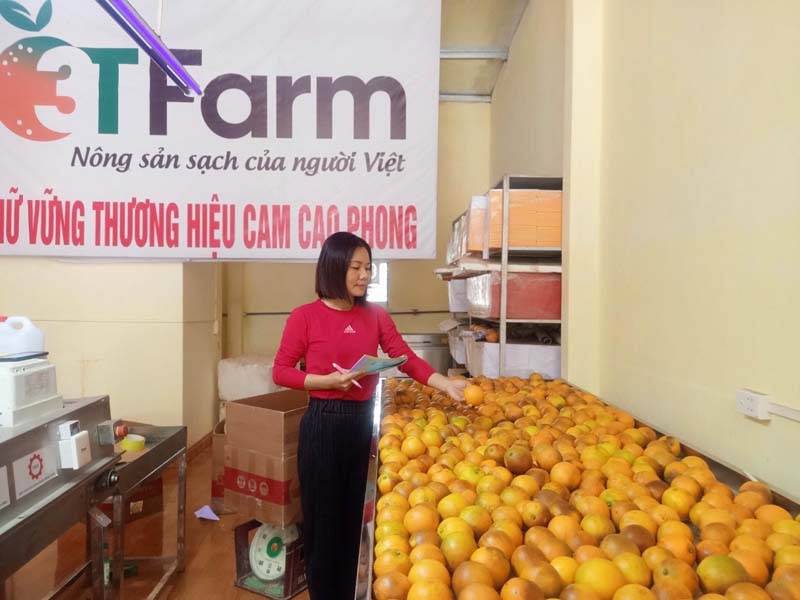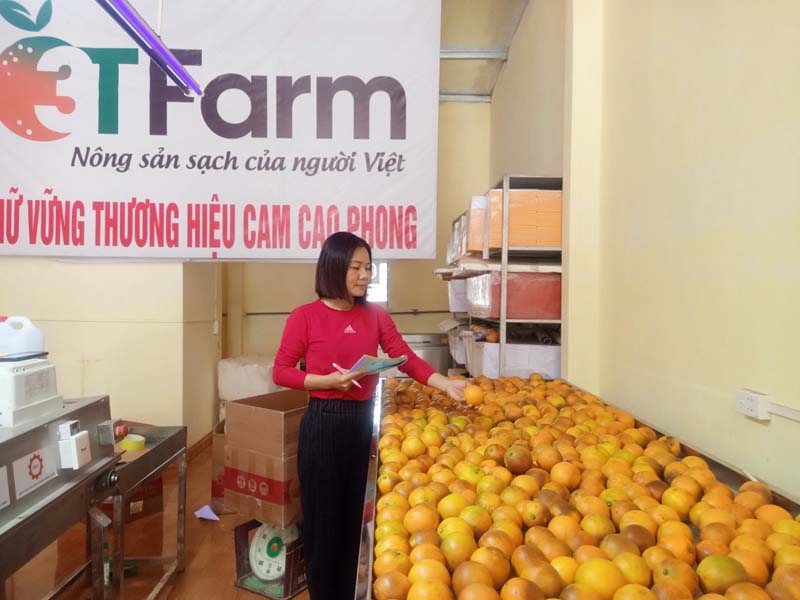
(HBO) – Being a pioneering force in implementing the One Commune One Product (OCOP) programme, co-operatives always take the initiative to improve product quality, packaging, labeling and create origin-tracing stamps to meet the programme’s standards.
In 2019, Hoa Binh province had 27 products qualified for
OCOP standards, of which, 16 were from 13 co-operatives. They included five
four-star and 11 three-star products.
 To
have high-quality oranges, the Cao Phong 3T farm produce co-operative develops
a processing line, which consists of classifying products, washing fruits with
ozone, drying and packing orange with bio-film wrap.
To
have high-quality oranges, the Cao Phong 3T farm produce co-operative develops
a processing line, which consists of classifying products, washing fruits with
ozone, drying and packing orange with bio-film wrap.
To assist co-operatives joining the OCOP programmes, the province’s alliance
of cooperatives has revised traditional products and staples of each locality and
helped complete dossiers to take part in the programme.
Co-operatives have spared no efforts to improve the quality of their products, bolster
production in value chain and under VietGAP standards. They also paid attention
to trademark registration, labels and origin-tracing stamps. Therefore, a
number of co-operatives have various products qualified for the OCOP programme,
particularly Ha Phong with four.
Some local OCOP products, namely fresh whole chicken of the Lac Thuy chicken
breeding co-operative in An Binh commune (Lac Thuy district), Giang Loc red
flesh pomelo in Man Duc township (Tan Lac district), handmade brocade weaving in
Lac village of Chieng Chau commune (Mai Chau district), "doi” seed in Chi Dao
(Lac Son), are all traditional items of the locality.
Those products have become popular and gained consumers’ trust. Effective
operations of the co-operatives have helped raise income for members and
workers.
Some local co-operatives have being devised plans for production and
application of science and technology to bolster quality services in keeping
with the value chain. They also step up trademark registration and the use of
origin-tracing stamps to join the programme in upcoming years.
Statistics showed that as of the end of the first quarter, a total of 54
products, including those from 30 co-operatives, had been registered to take
part in the programme./.
According to data from the Hoa Binh Provincial Party Committee, the industrial production index for the first six months of 2025 is estimated to have increased by 20% compared to the same period last year. This marks the highest year-on-year growth rate for this period since 2020.
In the first six months of 2025, Hoa Binh province’s export turnover was estimated at 1.145 billion USD, marking an 18.11% increase compared to the same period in 2024. Import turnover was estimated at $ 804 million, a 17.15% increase, which helped the province maintain a positive trade balance.
The lives of the ethnic minority farmers in Tan Lac district have gradually improved thanks to the new directions in agricultural production. This is a testament to the collective strength fostered through the professional associations and groups implemented by various levels of the district’s Farmers’ Union.
With the motto the "product quality comes first,” after nearly one year of establishment and operation, Muong village’s Clean Food Agricultural and Commercial Cooperative, located in Cau Hamlet, Hung Son Commune (Kim Boi district), has launched reputable, high-quality agricultural products to the market that are well-received by consumers. The products such as Muong village’s pork sausage, salt-cured chicken, and salt-cured pork hocks have gradually carved out a place in the market and they are on the path to obtaining the OCOP certification.
In the past, the phrase "bumper harvest, rock-bottom prices" was a familiar refrain for Vietnamese farmers engaged in fragmented, small-scale agriculture. But today, a new spirit is emerging across rural areas of Hoa Binh province - one of collaboration, organisation, and collective economic models that provide a stable foundation for production.
Maintaining growing area codes and packing facility codes in accordance with regulations is a mandatory requirement for agricultural products to be eligible for export. Recently, the Department of Agriculture and Environment of Hoa Binh province has intensified technical supervision of designated farming areas and packing facilities to safeguard the "green passport" that enables its products to access international markets.



 To
have high-quality oranges, the Cao Phong 3T farm produce co-operative develops
a processing line, which consists of classifying products, washing fruits with
ozone, drying and packing orange with bio-film wrap.
To
have high-quality oranges, the Cao Phong 3T farm produce co-operative develops
a processing line, which consists of classifying products, washing fruits with
ozone, drying and packing orange with bio-film wrap.